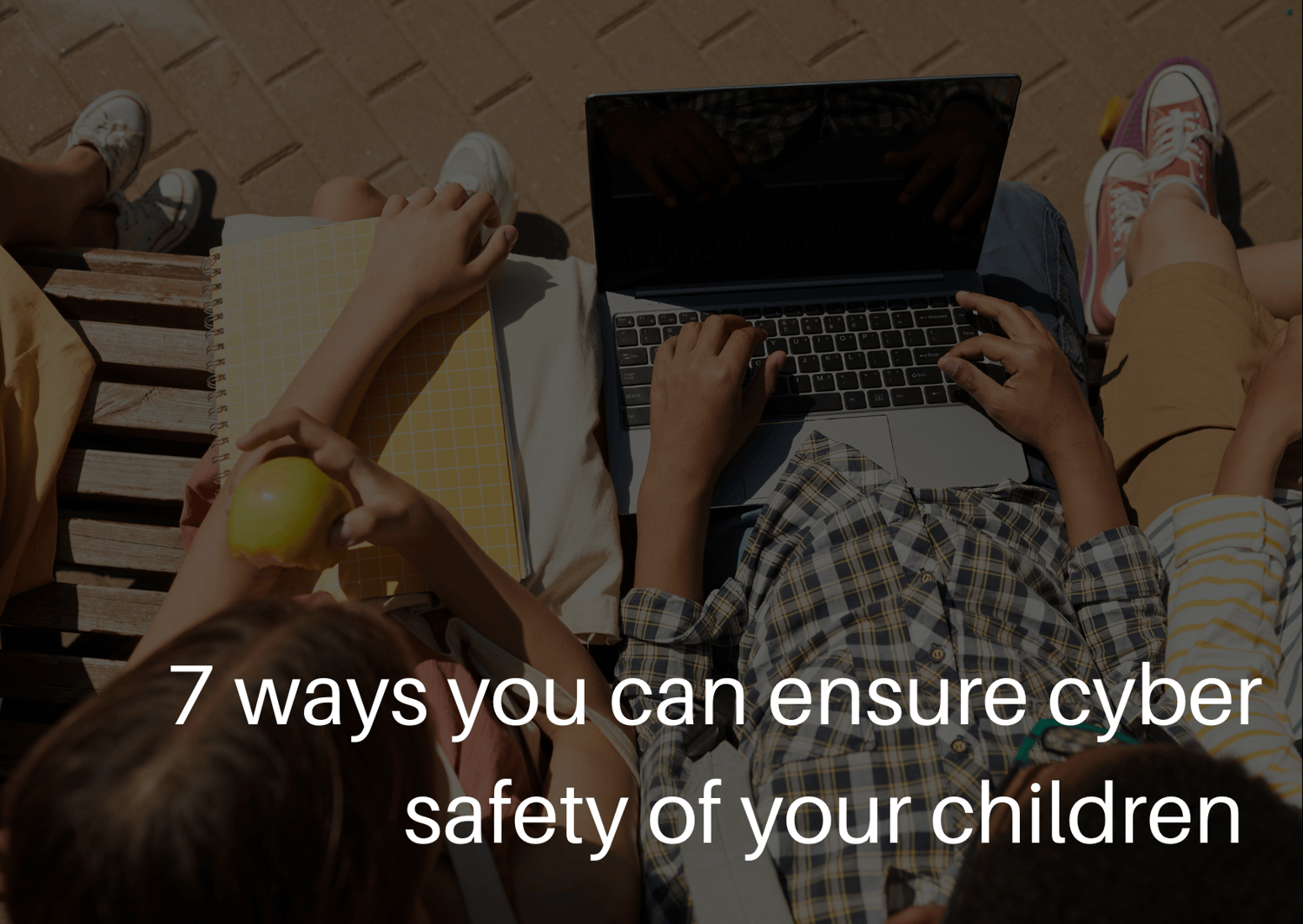Rohan, like any other kid, is a curious tween who spends most of his time on his phone at his friend's house, which is just a street away. Both of his parents are working . So out of concern for their child's online safety they installed parental controls on his device. Rohan’s Parents now feel assured that their son is now safe from any cyber safety threat and will not come across any age inappropriate content. What they are not aware of is that Rohan has already figured out multiple ways to bypass the system like opening locked applications in a browser, installing VPN etc. Getting to know this situation, do you think what Rohan's parents or other parents are doing is enough by merely installing controls and restrictions on the devices of their children? Well, the reality is a bit complex and achieving cyber safety is not so uncomplicated.
What is Cyber Safety?
Call it Cyber safety, Online Safety, Internet safety or E-Safety, it all indicates the same- a safe and secure online being. Utilizing information and communication technologies—including the internet, social media, online gaming, smartphones, tablets, and other connected devices—safely and responsibly encompasses the concept of cyber safety. It also concerns the emotional and psychological impact of what you see, read and hear online. It is a cyber safety issue if a teenager receives Facebook or Instagram messages from people she knows at school, telling her she is stupid or ugly or that she should kill herself. It is a cyber safety issue if a child sees age-inappropriate sexual or violent content online or even comes in contact with undesirable people like predators, cyberbullies, phishing scammers etc.
The myth of achievement of cyber safety
Most parents across the world who are thinking about and putting efforts to keep their children safe on the internet often end up taking only superficial measures that are not strong enough to keep their children safe even though they might appear to be sufficient. The myth of achievement of cyber safety is that merely installing parental controls will do the job. But the fact is, no one measure works in isolation, keeping children safe online is a multifaceted effort. It is complex in nature because all the stakeholders in a child’s life and other indirect bodies play a role in making sure cyber safety is achieved, but achieving it is not complicated. Read ahead to know what you can do to keep your children safe online.
1) First things first, is your child ready for the Internet?
Internet and social media is an open blank canvas on which any person can come and paint anything they like for everybody to see and your child might not be ready for it. Just like before teaching your children how to walk on their own, you make sure they have learned to stand up, before handing over devices and internet to use to your children, make sure you sit down with them and have an open communication about the following things
- Body positivity, body safety, sex and sexuality. Because content on the internet is glamorized, sexualised and highly edited
- What is safe and what is unsafe information to share with others on the internet
- Who they should and who they should not interact with on the internet
- What sites and apps they can and cannot visit/use
- Make sure they know that whenever they come across an uncomfortable situation on the internet, they can come to you and you will listen to them.
It does not end here. You can have this talk with them and they still can be not entirely ready to use the internet. You can have all the talk you can, but it also depends upon how much your child is fully understanding things, comprehending situations on the internet and their resilience to face adversities.
Evaluating what is safe and unsafe on the internet is a hard enough task for adults itself, so think how it must be for your children to be mindful of your instructions while making decisions about what to click on and what not.
So, know if your child is physically, emotionally, spiritually equipped and resilient enough to manage or cope with the content they will encounter in the online world.
2) Parental control measures
Parental controls give you complete authority over your child's Internet experience. This can include anything from the amount of time they can spend online to the applications and websites they can use. These applications show so much technical potential for the safety of a child but still can sometimes do more harm than good.
The drawbacks of Parental Controls are -
- With parental controls parenting consequently becomes passive instead of promoting a healthy active-participation . Here, you might end up relying more on App data and control measures rather than the quality of bond with your child. These make us lose out on all the emotional and connective factors like trust and attachment in a Parent-child relationship.
- Your child can get access to devices without these parental controls when they are with their friends or can bypass them and make them less efficient.
Remember merely installing parental controls on the devices of your child is not enough. It can be one of the ways to keep your children safe but it is not the only way.
3) Instilling fear and Installing bans does not work
You are not allowed to play games from now on! No screen time for you henceforth! If you don't listen to me, I will be taking your device away. Does this sound like you? We all agree with the idea that the Internet and the use of gadgets should be supervised and the usage controlled. However, fear appeals will never be a sound way to influence your child's behavior. You might be as careful as possible but remember that your child can go off to his/her friend's place to surf the net, where there is every chance that he/she may become a victim to internet predators. And, with the stringent rules, the child might find it difficult to approach you in case they become entrapped in any cyber issue.
4) Parental supervision is very important
Consistent supervision of the online activities of your child is crucial in keeping them safe. Supervision in a non-invasive way and in a way your child is willing and comfortable too will go a long way. Leaving children unsupervised with the internet is a recipe for unsafety.
Monitor what sites they are visiting, what apps they are on, who they are talking to and have conversations and feedback about the same with them. Communicate with then what habits you want them to inculcate when it comes to using the internet and gadgets (like no gadgets in closed rooms and after 9pm) and not only make sure that they are following these rules but also that you are supervising them and observing what they do.
5) Overprotection always flips
If you are an overprotective or an overly cautious parent, you might put forth boundaries that are too restrictive for the development of your child. Banning the Internet is not the best solution. We need to begin with the understanding that the continuum of cyberspace includes the extremes of safe or unsafe, appropriate or inappropriate, useful or dangerous content and activity. As much as you'd like to protect your child from the dark side of the Internet, recognize the brighter side of learning, Information sharing and communication.
6) Draft a contract
Draft a contract with your children that has mutually decided rules about usage of the internet and gadgets. Go in as many details as possible. Note down what sites they can and cannot visit, what apps they can use, who they can talk to, what are the hours in which they are allowed to be on the phone. Make sure you communicate that
- They can reach out to you if they face an uncomfortable situation on the internet or if they have breached the contract
- You are there for them and will always listen
- It is their responsibility to make sure they stay true to it
Make sure the statements in your contract are mutually decided by you and your children, this will not only help you understand their perspective of the internet but will also keep them interested in it as they will feel involved.
7) Keep updating your talk, controls, supervision, rules and contracts.
Cyber safety measures are not a one time exercise. They evolve and grow with your children.
As with very young children they might not really understand rules and how to present their views while drafting a contract so parents have to rely more on parental controls and supervision.
As they grow up, they might feel suffocated by contestant supervision and the contract rules might need some upgrade as they might need to be on the internet for a longer time to read up about an assignment. Here, open communication and mutual understanding can be put to more of an use.
Needs and habits of children will constantly grow and change as they grow up and it is very important that protective and preventive measures also keep updating with time. An outdated measure will become irrelevant as your child will grow and will not really be able to protect your child after a point..
Cyber safety is everyone’s responsibility. Young people, parents, families, educators, school administrators, the government, non-profit organizations, the criminal justice system and tech corporations all have a part to play in making the internet a safer place. But here's the harsh reality. A parent can do everything right, teach their kid about body safety and sexuality, teach online safety, update privacy settings, install parental controls, inculcate cyber safe habits and still witness their child falling prey to cybercrimes. If you really think about it, no one is truly 100% safe, you can just be safer and by undertaking all the safety measures you can make sure that your child is many many more times safer than they would be without them. Internet safety is a possibility and you can make it happen for your child. But remember that it has to be a holistic and updating approach. Measures that are 360° approaches and not a mere one time talk with your child or a software installment on their device.
If you understand the importance of the Internet world but would like to make your child's digital swimming as safe as possible, do check out our work. Cactus Foundation had recently organized a 4 day Inter-continental conference on “Decoding Cyber Safe Parenting” which also brought on board the best industry experts. Our Beyond Borders Conference gives a 360 degree view of cyber safety



Comments ()